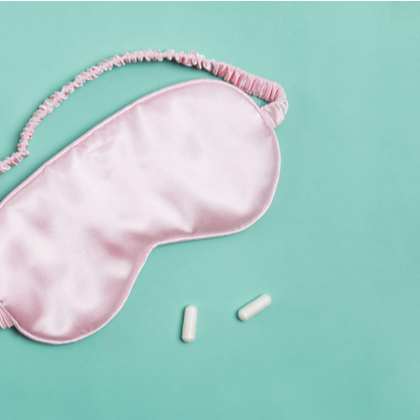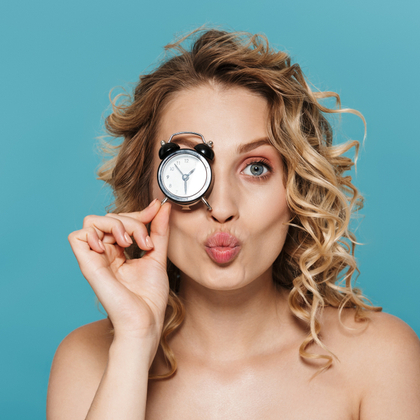
From our exercise routines to our mental health, various factors influence the quality of our sleep. Hormones also play a crucial role. Aside from supporting reproduction, growth, and appetite regulation, hormones help govern our sleep-wake cycle, also known as the circadian rhythm. Here, we look at the specific hormones responsible for promoting wakefulness and encouraging sleep.
What is the circadian rhythm?
Have you ever wondered why you feel sluggish or energised at different points in the day? This is down to your circadian rhythm or circadian cycle. Governed by a cluster of nerve cells in the brain known as the hypothalamus, the circadian rhythm serves as the body's intrinsic 24-hour clock, which regulates the sleep-wake cycle.
As diurnal beings, humans are naturally programmed to rest at night and be active during the day. For many people, the most noticeable energy fluctuations occur in the middle of the night (between 2 am and 4 am) and just after lunch (between 1 pm and 3 pm). With good sleep hygiene, these highs and lows aren’t so obvious. However, without adequate rest, you may find yourself craving a post-lunch nap even more.
The circadian rhythm thrives on order and routine, so maintaining regular sleeping habits is essential. Late-night social events, shift work, and jet lag can throw off your internal body clock, making you feel tired, lethargic, and irritable.
Which hormones regulate the sleep-wake cycle?
Melatonin
Also known as the ‘sleep hormone,’ melatonin is secreted by the pineal gland in response to darkness, often coinciding with sunset (1). The brain initiates the release of melatonin a few hours before bedtime, serving as a signal for the body to begin winding down (2).
However, in today’s modern environment, late-night exposure to artificial light – notably the blue light emitted by electronic devices like phones and TVs – can interfere with the natural production of melatonin and affect sleeping patterns. Blue light signals the brain to stay awake when it should prepare for rest.
Sleep experts now recommend disconnecting from devices at least an hour before bed or eliminating technology from the bedroom entirely to reduce exposure to blue light, support melatonin production, and encourage restful sleep.
Serotonin
Often described as the body’s ‘happiness’ hormone, serotonin is a neurotransmitter that influences emotions, mood, appetite, memory, and, crucially, sleep.
Serotonin’s role in the sleep-wake cycle is both multifaceted and complex. Although serotonin helps maintain sleep, it can also prevent you from falling asleep (3). Additionally, it serves as a chemical precursor to melatonin. In simpler terms, your body relies on serotonin from your pineal gland to produce melatonin.
Cortisol
Widely regarded as the ‘stress hormone,’ cortisol reaches its peak just before you wake in the morning. It plays a vital role in revitalising the body, activating energy reserves, and stimulating your appetite.
However, because cortisol prepares the body for action, its secretion near bedtime or throughout the day – especially during periods of high stress – can make it much harder to fall asleep. That’s why taking the time to relax and unwind before bed is so important.
Find out more
If you found this piece on sleep hormones useful, you can delve deeper into similar insights on our dedicated Sleep Health Hub. Alternatively, please get in touch with our team of expert Nutrition Advisors, who are on hand to provide free, confidential advice via email, phone, and Live Chat.*
*Subject to cookie consent
References:
-
Melatonin, the hormone of darkness: From sleep promotion to Ebola treatment. Masters, A., Pandi-Perumal, S. R., Seixas, A., Girardin, J. L., & McFarlane, S. I. (2014) Brain Disorders & Therapy. 4(1), 1000151.
-
The effectiveness of melatonin for promoting healthy sleep: A rapid evidence assessment of the literature. Costello, R. B., Lentino, C. V., Boyd, C. C., O’Connell, M. L., Crawford, C. C., Sprengel, M. L., & Deuster, P. A. (2014) Nutrition Journal. 13, 106.
-
Neuropharmacology of Sleep and Wakefulness. Watson CJ, Baghdoyan HA, Lydic R. (2010) Sleep Med Clin. 5(4):513-528.
Related Posts

Olivia
Olivia Salter has always been an avid health nut. After graduating from the University of Bristol, she began working for a nutritional consultancy where she discovered her passion for all things wellness-related. There, she executed much of the company’s content marketing strategy and found her niche in health writing, publishing articles in Women’s Health, Mind Body Green, Thrive and Psychologies.
View More



